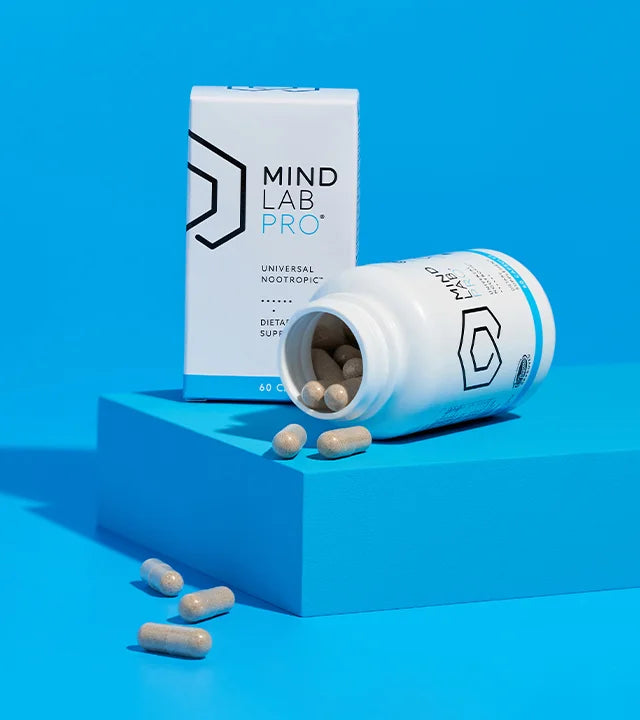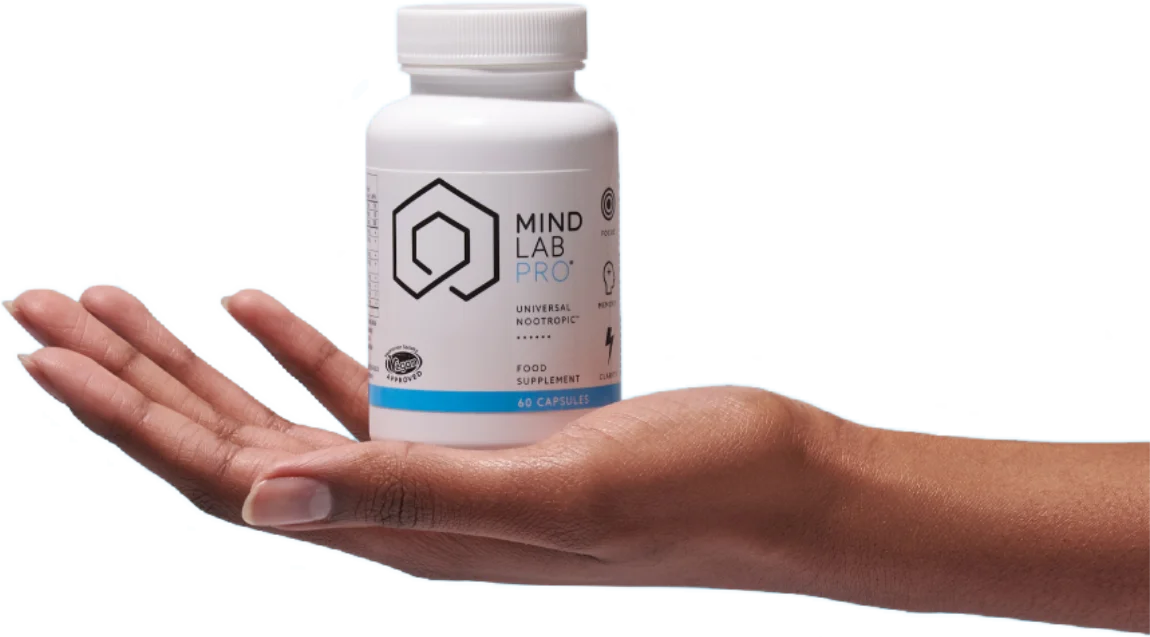Yes, and there are many reasons you should take Lion’s Mane before bed if you want to reap the benefits of a natural sleep aid. However, you can also take lion’s mane at other times of the day too.
So, how does lion’s mane work as a sleep aid?
What are the other benefits of lion’s mane?
Where can you find lion’s mane?
Read on to find out!
Key Takeaways
-
Yes, you can take Lion’s Mane before sleep — it may even support relaxation and act as a natural sleep aid, though it's also suitable for daytime use.
-
Supports cognitive and emotional wellness — research suggests benefits for memory, focus, mood, anxiety, and mild cognitive decline.
-
May promote nerve growth factor (NGF) and BDNF activity — these mechanisms help support brain cell regeneration, neuroplasticity, and long-term brain health.
-
Generally well tolerated — most studies do not report sedation as a side effect, though a small number of users experienced mild issues (e.g. digestive discomfort, nausea, skin rash).
-
Consider a nootropic stack — if you're seeking cognitive energy along with Lion’s Mane benefits, a premium all-in-one formula (such as Mind Lab Pro) provides energizing support to offset potential drowsiness.
What is Lion’s Mane?
Lion’s Mane, also known as Yamabushitake, is an edible mushroom belonging to the tooth fungus group. Lion’s mane can be identified by its long white spines, resembling an actual lion’s mane!
This extraordinary mushroom is harvested for traditional Chinese medicine and cuisine, as it’s widely known to have beneficial effects on the body thanks to its bioactive compounds. It's not surprising that Lion's Mane Mushroom is commonly used in the most effective nootropic supplements.
Some of the many health benefits include:
- Improving cognitive function
- Anti-inflammatory and antioxidant properties
- Anti-depressant and anxiolytic properties
- Protecting against digestive ulcers
You can consume lion’s mane in raw and cooked form (popularly as a tea or coffee), or as a supplement in powder, capsule, or liquid form. Lion’s mane is actually a popular ingredient in nootropic formulas due to its powerful effects on the brain!
I was skeptical at first, but I can say that I feel sharper and more clear minded than as long as I can remember.John Y

Can You Take Lion’s Mane Before Bed?
Sleep problems are very common nowadays, and it’s no surprise seeing as screen time, caffeine consumption, and everyday stress are all on the rise! We have all suffered an evening of restlessness and poor sleep, which is normal to experience from time to time.
However, longer stretches of poor sleep can have negative effects on our everyday life and health such as:
- Feeling fatigued
- Experiencing brain fog
- Lacking focus and concentration
- Mood swings
- Increased risk of chronic diseases
- Shortening our life expectancy
As new research on lion’s mane emerges, it’s becoming evident that it may be a useful sleep aid for many reasons, thus supporting the idea of taking lion’s mane before bed.
Support calm, clear days—and restful nights
Mind Lab Pro® delivers 500 mg Lion’s Mane per serving in a clean, non-stim stack that’s caffeine-free.
Lion’s Mane Before Bed: An Effective Adaptogen

Mushrooms are known to have adaptogenic properties, particularly lion’s mane - the all-natural brain booster! Adaptogens are substances that work to counteract the effects of stress in the body.
As we know, stress can have many physical effects on your body, including harming your immune and endocrine systems1, which can often have a knock-on effect on our sleep quality.
Lion’s mane adaptogenic properties can help offset these physical changes, alongside easing symptoms of mild anxiety and depression2, and regulating our neuroendocrine systems.
Due to these positive effects, consuming lion’s mane may be a great addition to your pre-bedtime routine, particularly if stress and anxiety is hindering your sleep!
Supporting Nerve Growth Factor (NGF)
You'll find active nootropics called hericenones and erinacines in lion's mane, which stimulates the synthesis of nerve growth factor (NGF). In turn, this promotes overall brain health.3
NGF is part of the family of neurotrophins, which are responsible for the growth, survival, and developmental plasticity of target neurons.4
It’s been shown that NGF is involved in the modulation of naturally-occurring sleep and wakefulness 5, indicating that lion’s mane may help us dial in our sleep-wake cycle!
Combatting Delayed Sleep Phase Syndrome
Those who suffer with delayed sleep phase syndrome (DSPS) may find themselves falling asleep unusually late and experiencing difficulties with waking up the following morning due to poor signaling from their internal clock.
One study has noted that lion’s mane may serve as a functional food in the prevention and treatment of delayed sleep phase syndrome by advancing the sleep-wake cycle.6
Does Lion’s Mane Have Any Side Effects?
There have been no major side effects of lion’s mane reported, however it’s best to avoid it if you have an allergy to mushrooms. As always, we recommend consulting your doctor before taking any new supplement!
Try Mind Lab Pro® for Balanced Sleep and Daytime Focus
Mind Lab Pro® features 500 mg of organic, full‑spectrum Lion’s Mane (mycelium + fruiting body) in each serving, delivering active compounds like hericenones and erinacines for both deep sleep support and daytime cognitive performance.
It’s also caffeine‑free, stimulant‑free, and backed by multiple clinical studies showing improved memory, recall, and mental clarity.
Plus, Mind Lab Pro® is the only nootropic formula with independent human trial data showing measurable improvements in memory, recall, and information processing.
How to Try It
-
Take 2 NutriCaps® (~500 mg Lion's Mane) of Mind Lab Pro® in the evening.
-
Observe how it affects your sleep over several nights.
-
For daytime cognitive focus, shift to morning or afternoon use as needed.

Take-home Message
It appears the benefits of lion’s mane aren’t unique to our waking life! The advantages of taking lion’s mane before bed are becoming increasingly apparent, so we definitely recommend trying it out for yourself if you’re looking for an aid to help you wind down and get a better night’s sleep!
References
- Panossian A, Wikman G. Effects of Adaptogens on the Central Nervous System and the Molecular Mechanisms Associated with Their Stress-Protective Activity. Pharmaceuticals (Basel). 2010;3(1):188-224. Published 2010 Jan 19. doi:10.3390/ph3010188
- https://examine.com/supplements/lionsmane/
- Aloe L, Rocco ML, Balzamino BO, Micera A. Nerve Growth Factor: A Focus on Neuroscience and Therapy. Curr Neuropharmacol. 2015;13(3):294-303.
- Ramos OV, Torterolo P, Lim V, Chase MH, Sampogna S, Yamuy J. The role of mesopontine NGF in sleep and wakefulness. Brain Res. 2011;1413:9-23.
- Furuta S, Kuwahara R, Hiraki E, Ohnuki K, Yasuo S, Shimizu K. Hericium erinaceus extracts alter behavioral rhythm in mice. Biomed Res. 2016;37(4):227-32.

